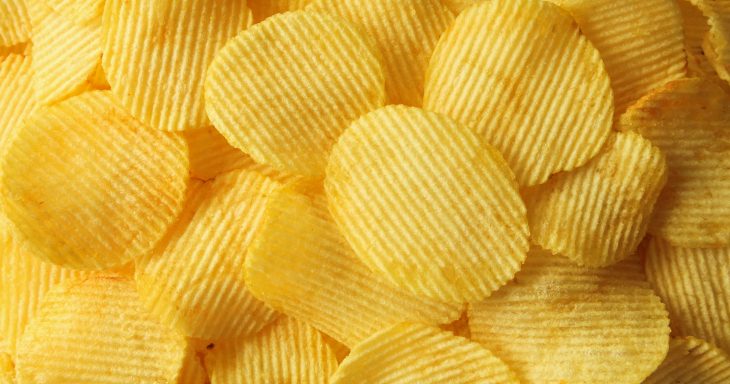
Potato chips are a beloved snack enjoyed by people around the world. Crispy, flavorful, and satisfying, they make for a delicious treat. However, it’s important to be aware of their nutrition facts to make informed choices about your snacking habits. In this article, we’ll explore 20 key insights into the nutrition profile of potato chips.
Calories
Potato chips can be high in calories, with an average serving of 1 ounce (about 28 grams) containing approximately 152 calories. It’s essential to be mindful of portion sizes to avoid excessive calorie intake.
Fat Content
Most potato chips contain a significant amount of fat. The average 1-ounce serving provides around 10 grams of fat, of which saturated fat constitutes a portion. Opting for baked or reduced-fat varieties can help lower your fat intake.
Sodium
Potato chips tend to be high in sodium, which is a concern for individuals with hypertension or those aiming to reduce their sodium intake. A 1-ounce serving typically contains around 136 milligrams of sodium.
Carbohydrates
Carbohydrates are the primary energy source in potato chips. One ounce of potato chips contains approximately 15 grams of carbohydrates, mainly in the form of starch.
Fiber
Unfortunately, potato chips are not a significant source of dietary fiber. On average, a 1-ounce serving provides only about 1 gram of fiber.

Protein
While potato chips are not known for their protein content, they still contribute a small amount. A 1-ounce serving typically contains around 2 grams of protein.
Vitamins
Potato chips generally have low vitamin content, but they do contain some essential vitamins. These include small amounts of vitamin C, vitamin E, and certain B vitamins like niacin and thiamin.
Minerals
Potato chips contain trace amounts of minerals such as potassium, magnesium, and iron. However, the quantities are relatively small compared to other food sources.
Micronutrients
Potato chips can provide small amounts of micronutrients like zinc, copper, and manganese. These minerals play crucial roles in various bodily functions.
Glycemic Index
The glycemic index (GI) measures how quickly carbohydrates in a food raise blood sugar levels. Potato chips have a high GI, meaning they can cause a rapid increase in blood glucose.

Trans Fat
Traditional potato chips often contain trans fats, which are unhealthy fats linked to various health issues. It is advisable to choose chips with zero trans fat or opt for healthier alternatives.
Cholesterol
Potato chips are typically cholesterol-free since they are plant-based snacks. However, it’s essential to be cautious of the additional ingredients used, such as flavorings or dips, which may introduce cholesterol.
Allergens
Potato chips are generally gluten-free, making them suitable for individuals with gluten sensitivities or celiac disease. However, it’s always advisable to check the packaging for potential cross-contamination.
GMOs
In most cases, potato chips are made from genetically modified potatoes. However, the use of genetically modified ingredients may vary depending on the brand and region.
Artificial Additives
Some potato chips may contain artificial additives, such as flavor enhancers, preservatives, or artificial colors. Opting for brands that use natural ingredients can help minimize the consumption of these additives.

Oil Used for Frying
Potato chips are typically fried in oils, such as vegetable oil, sunflower oil, or canola oil. The choice of oil can impact the nutritional profile and overall healthiness of the chips.
Portion Control
To enjoy potato chips without overindulging, practicing portion control is essential. Measuring out a serving size and avoiding mindless eating can help maintain a balanced diet.
Healthier Alternatives
For those looking for healthier options, there are alternatives to traditional potato chips. Baked chips, vegetable chips, or homemade versions using oven-baked potatoes can be excellent choices.
Moderation
As with any snack, moderation is key when consuming potato chips. Balancing your overall diet with nutrient-rich foods and enjoying potato chips in moderation can help satisfy cravings while maintaining a healthy lifestyle.
Pairing with Dips
Potato chips are often enjoyed with dips and sauces. While these additions can enhance the taste, they may also increase calorie, fat, and sodium intake. Opting for healthier dip options, such as Greek yogurt-based dips or homemade salsa, can be a wise choice.
Conclusion
Potato chips, while delicious, should be consumed in moderation due to their nutritional composition. By being aware of the nutrition facts and making informed choices, you can enjoy potato chips as part of a balanced diet.
Frequently Asked Questions (FAQs)
Are there any potato chip brands that offer healthier options?
Yes, several brands offer baked or reduced-fat potato chips, which can be healthier alternatives to traditional fried chips. Look for options labeled as such in your local grocery store.
Are homemade potato chips a healthier choice?
Homemade potato chips can be a healthier choice compared to store-bought varieties since you have control over the ingredients and cooking methods. Baking thinly sliced potatoes with minimal oil can result in a healthier snack.
Can potato chips be part of a weight loss diet?
While potato chips can fit into a weight loss diet in moderation, it’s important to consider portion sizes and overall calorie intake. Choosing healthier alternatives or incorporating them as an occasional treat can support weight management goals.
Are sweet potato chips a healthier option?
Sweet potato chips can be a healthier alternative to regular potato chips. They are often lower in calories, higher in fiber, and contain more vitamins and minerals. However, it’s still important to watch portion sizes and avoid excessive added oils or seasonings.
Can I enjoy potato chips if I have dietary restrictions, such as gluten intolerance?
Yes, potato chips are generally gluten-free, making them suitable for individuals with gluten intolerance or celiac disease. However, always check the packaging for potential cross-contamination if you have severe sensitivities.
Was this page helpful?
Our commitment to delivering trustworthy and engaging content is at the heart of what we do. Each fact on our site is contributed by real users like you, bringing a wealth of diverse insights and information. To ensure the highest standards of accuracy and reliability, our dedicated editors meticulously review each submission. This process guarantees that the facts we share are not only fascinating but also credible. Trust in our commitment to quality and authenticity as you explore and learn with us.
